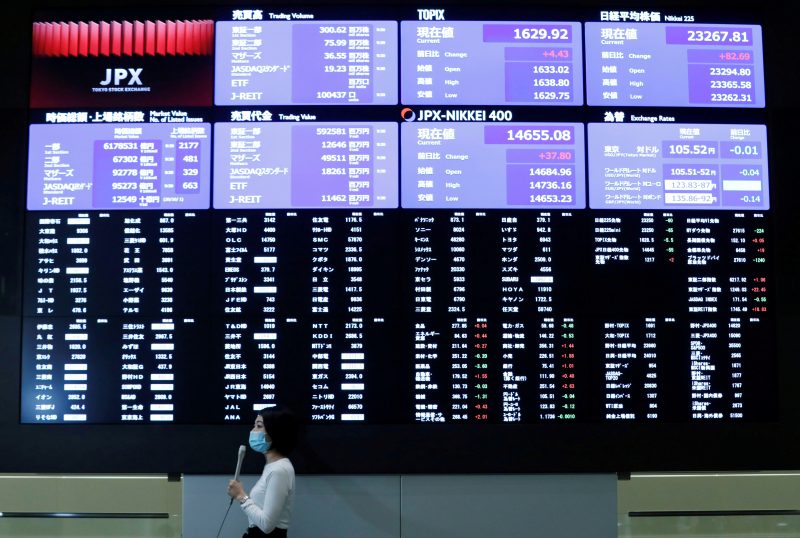TOKYO/NEW YORK – Asian stocks edged higher on Friday, buoyed by gains in China, but the mood was cautious due to a resurgence of coronavirus infections in Europe and the United States.
MSCI’s broadest index of Asia-Pacific shares outside Japan <.MIAPJ0000PUS> rose 0.27%. U.S. stock futures <ESc1> also gained 0.32%.
Shares in China <.CSI300> rose 0.39% as investors snapped up banking shares due to an improving earnings outlook.
Australian stocks <.AXJO> erased early losses to trade flat. Japanese stocks <.N225> edged 0.05% higher, but South Korean shares <.KS11> lost 0.32%.
Oil futures extended declines in Asian trade as another round of lockdowns to contain the spread of the coronavirus threatens to further weaken global energy demand.
U.S. President Donald Trump’s offer on Thursday to raise the size of a fiscal stimulus package to win the support of Republicans and Democrats helped narrow Wall Street losses, though many investors still believe a deal is unlikely before the Nov. 3 election.
“There’s a bit of worry there and also at what we’re seeing in America and in Europe regarding the virus and how it seems to be taking hold pretty significantly again,” said Grant Williamson, investment adviser at Hamilton Hindin Greene in Christchurch, New Zealand.
On Wall Street, the Dow Jones Industrial Average <.DJI> fell 0.07%, the S&P 500 <.SPX> 0.15% and the Nasdaq Composite <.IXIC> dropped 0.47%.
An unexpected rise in U.S. weekly jobless claims figures added to worries about a sputtering world economy, especially in the face of a spike in COVID-19 cases in Europe.
The dollar index <=USD> stood at 93.78, close to a two-week high as signs of a stalling U.S. economy drove safe-harbour flows into the greenback.
The one currency that the dollar fell against was the yen, which strengthened 0.15% to 105.31 per dollar given the Japanese currency is also seen as a haven.
The euro <EUR=> was down 0.01% to $1.1709, while a firmer U.S. dollar dragged on sterling <GBP=>, which was last trading at $1.2900, down 0.12% on the day.
Spot gold <XAU=> was little changed at $1,908.40 an ounce.
The coronavirus outbreak originated in China last year, but Beijing’s aggressive efforts to control the virus mean its economy is recovering faster than other major countries, which suggests an improvement in corporate earnings.
Hong Kong shares in Semiconductor International Manufacturing Corp <0981.HK> (SMIC) rose 2.53% on Friday after China’s top chipmaker raised revenue and gross margin forecasts for the third quarter.
In contrast, many European countries have resumed lockdowns, and London will enter a tighter COVID-19 lockdown from midnight on Friday as Prime Minister Boris Johnson seeks to tackle a swiftly accelerating second coronavirus wave.
The European Union put the onus on Britain to compromise on their new economic partnership or stand ready for trade disruptions in less than 80 days, another negative for sterling.
The Australian dollar fell 0.2% versus the greenback at $0.7094, hurt by a decline in commodities.
Oil prices were weighed by concerns about the coronavirus and its impact on the world economy. Brent crude futures <LCOc1> fell 0.6% to $42.90 a barrel, while U.S. crude futures <CLc1> slipped by 0.44% to $40.77 a barrel.
Traders’ preference for safety helped government bonds. The yield on U.S. Treasuries Benchmark 10-year notes <US10YT=RR> held steady at 0.7339%, while the two-year yield <US10YT=RR> edged lower to 0.1390%.
(Reporting by Suzanne Barlyn; Editing by Sam Holmes)
























